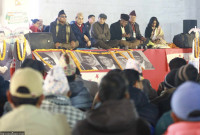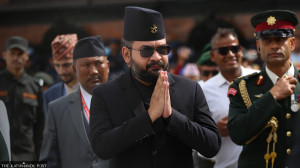Opinion
Money and medicine
The doctor has become more like a hotel employee who works to generate profit for the employer
Sophia K Tamot
Ever since I was tricked into being jabbed with needles as a toddler, people in white coats always filled me with apprehension. Over the years, my perception changed, as with time I grew to respect and admire those in the profession—those who chose to serve others selflessly as they continuously strived for innovation to combat disease and disorder and in the process, extend and improve human life. The admiration was such that all parents of a certain generation wanted their children to become doctors.
But if you ask me today, I have mixed feelings. My recent first-hand experience at a renowned international hospital in Thapathali has reaffirmed the rising apathy and appalling commercialisation that is devouring the state of medical services in our country.
Duping inpatients
Granted, it is quite natural that the number one objective of any company’s shareholders is to make profit. And it is so for all private hospitals. But by choosing to operate a medical facility, you expect the patient’s needs to come first, to be served in a fair manner, without prejudice, and not have add-ons piled on to you without first seeking explicit permission.
However, here in Kathmandu, a few big private hospitals seem to be increasingly and unscrupulously duping the patient party and getting away with it. This is either through certain types of drugs that are associated with higher commission fees for doctors, medical items on the patient’s invoice that have either not been used or are charged extra for, and even wrong diagnoses. Whether a lot of this is done carelessly or unknowingly is hard to tell, but the fact that overcharges are predominantly always present in every inpatient invoice is too much of a bizarre coincidence, don’t you think?
Another example. For a patient who has been diagnosed with acute bronchitis to be looked after by four doctors who stop by twice a day for five minutes each, each offering differing opinions, a chest physiotherapist whose job is to administer the strongest antibiotics, the price of which the doctors proudly tell you is the most expensive in the country, is hardly akin to good medical practice. It feels more like being a helpless victim who is fleeced and slapped with hefty bills during departure. The only thing missing is a sign that says, hope you had a nice stay and see you again.
Many of these private hospitals have some of the ‘best’ doctors in the country, which is why patients go to these hospitals in the first place. A lot of the out-patient departments run very well but the cream of the profits comes through the inpatient departments.
Hospitals and hotels
In other words, these hospitals are run exactly like hotels. A high rate of occupancy plus more tests, more drugs, more consultations equals lots of revenue. Lots of profit equals happy shareholders. And hospitals these days churn out their own batch of nurses from an affiliated medical and nursing college, year after year. A nursing diploma with an assured job placement is a very attractive proposition. Unfortunately, a lack of experience means very often, it is the patient who has to bear the brunt of the nurse’s poor performance, intensified by her aloof attitude.
All this means that the doctor has become more like a hotel employee who works to generate profit for the employer and on the side, pockets a few commissions. The more I asked around and prodded, it appeared that many medical professionals that work in big hospitals in Nepal are continuously harassed by the management to fill up as many hospital beds as possible, as this is directly linked to the hospital’s revenue and in the process, the individual doctor’s stature vis-a-vis management.
Most private colleges that function today have practically no oversight, thanks to the government’s decision to award countless medical affiliations to the private sector without increasing its own capacity to review, monitor, and ensure compliance. As a result, many easily get admitted into medical colleges once they pay up. Weak monitoring also means many can skip the compulsory nine-week field assignment at the end of one’s MBBS and pupils as well as colleges go scot-free. This gaping loophole not only encourages an attitude of beating the system but also indiscriminately discourages professional ethical behaviour.
What kind of doctor?
Now think about this. A lot of the doctors and nurses that you will meet in some hospital in the near future will graduate from a lot of the private colleges that are functioning today. What does this say in terms of the future of our medical professionals and their standards?
With the number of new hospitals mushrooming across the country, the whiff of lucrative profits is inescapable. No big surprise then that every investor with links to powerful political parties is investing in the industry: in hospitals and in medical colleges. A doctor friend was telling me the other day that there are about 50 hospitals along the Ring Road and inside.
The queue and pressure for affiliations has placed the Institute of Medicine between the devil and the dark blue sea. Even the prime minister reneged on his commitment to Dr Govinda KC, who has now begun his fifth fast-unto-death hunger strike. It is shameful for the industry and for all us Nepalis that a selfless individual’s threat to starve to death is aimed merely at reminding our leaders to do their jobs properly. Success of politics is also measured through the efficiency of the government-run medical facilities and the services that are free.
As for the rest of us, let us cease to be mere passers-by. At every hospital visit, let us not be shy to demand, ask, probe, check, and investigate, instead of just shrugging it off or letting it go. We have to curb this quasi-criminal tendency of the growing commercialisation of the medical industry.




 17.12°C Kathmandu
17.12°C Kathmandu










